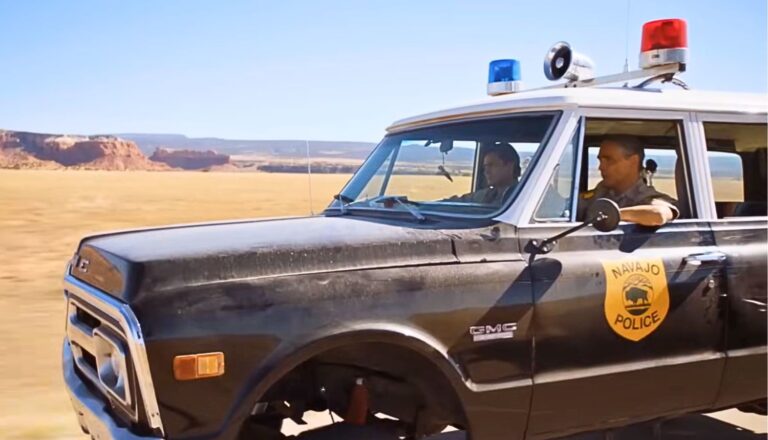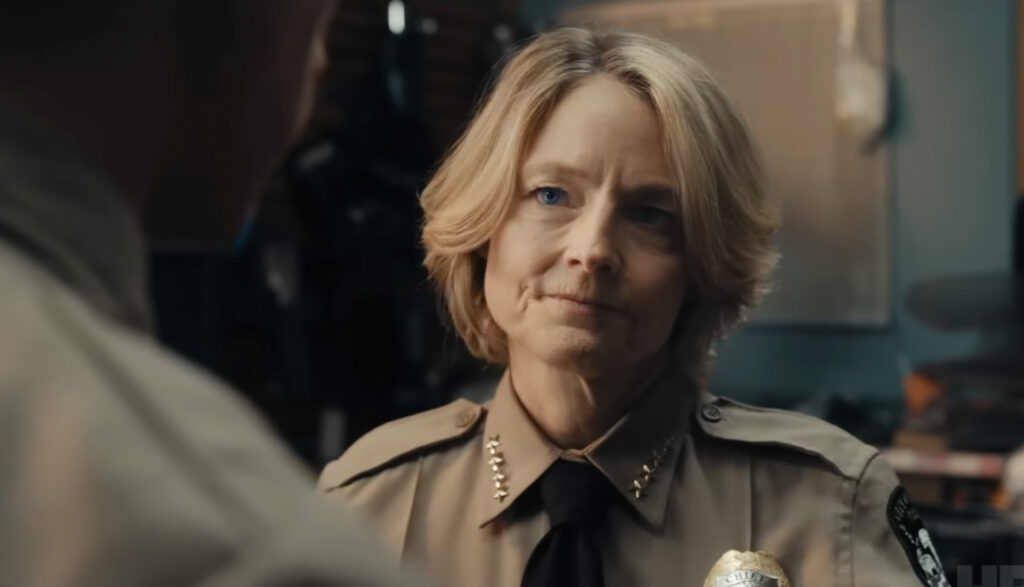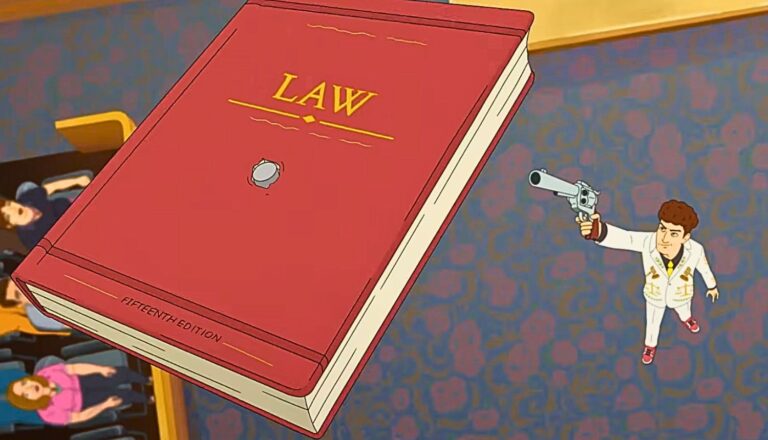
Dark Winds
AMC+ brings to life a murder-mystery series set in New Mexico, steeped in Navajo ways and filled with dark magic.

There is a darkness out there—a cold, hard, crushing blackness that crawls and gasps in society’s cobwebbed corners. It may appear in the flickering shadows of the Louisiana bayou or the sunless days in arctic Alaska.
And when that darkness is almost too bleak to be imagined, you can be sure that True Detective has already shaped a season around it, bringing it right into your living room.
True Detective’s first-season tagline was “Man is the cruelest animal.” And the series may be television’s cruelest show.
This HBO drama switches casts and storylines from season to season: Matthew McConaughey used his starring turn in the first season to begin his “McConaissance”; Oscar-winner Mahershala Ali fronted its third. Two-time Oscar honoree Jodie Foster headlines the fourth season. But no matter who stars, True Detective is a brooding work of prickly horror.
In Season Four, subtitled Night Country, the show’s darkness hits a more literal level. Taking place in and around the fictional Alaskan town of Ennis—150 miles north of the Arctic Circle—the sun sets in mid-December and doesn’t even peek above the horizon for weeks thereafter. And the lack of sunlight makes Ennis residents a little squirrelly.
“Just the third day of dark, and it’s already getting weird,” officer Hank Prior tells Ennis Police Chief Liz Danvers.
But soon it gets even more weird. Eight scientists from a remote scientific facility vanish. The only evidence left behind? A disembodied tongue. And that tongue might not belong to any of the missing scientists, but rather to Annie Kowtok, an indigenous woman who was murdered six years before—and whose killer was never caught.
State Trooper Evangeline Navarro found Kowtok’s body those six years prior, and she’s been haunted by the case ever since. The former Ennis officer had pursued the case so obsessively that she ran afoul of the town’s power brokers and was asked to transfer out. She believed that Liz, then the newly appointed chief, didn’t care about the case. But now, it seems, they’ll be working together. Liz needs to solve the disappearance of all those missing scientists, and both want to know what, if anything, that mystery has to do with Annie Kowtok.
And then, of course, they must deal with the ghosts—both metaphorical and, perhaps, literal. And by the time the story’s through, both Evangeline and Liz may long for a straightforward murder investigation.
True Detective has had an uneven history since its wildly praised first season, but many mainstream reviewers are calling the fourth season a return to form. This has all the earmarks of prestige television: intricate writing; solid acting; gripping storylines; and, of course, deeply problematic content.
True Detective is as violent and profane as any show on television. If its characters aren’t hopping into bed with someone, they’re likely shooting or beating someone else. The f-word flies as frequently as the gore. As well-constructed as this series may be, it’s hard to believe that any narrative payoff could be worth such a twisted and terrible ride.
In an episode from Season 1, Marty (a detective played by Woody Harrelson) tells Rust (Matthew McConaughey) why he left the police force. During a case, Marty discovered that a disturbed mother had tried to dry off her infant in a microwave oven. We watch as Marty opens the oven and stares, aghast. Sick.
“I didn’t want to look at anything like that anymore,” he says.
We might well say the same thing.
She’s awake.
So says a shaking scientist to a coworker, one of eight working in a remote Arctic facility. It’s the last we—or anyone else—hear from them. Three days later, a delivery driver finds the place deserted and a human tongue on the floor. Ennis Police Chief Elizabeth Danvers is called into investigate, and she’s soon contacted by old colleague Evangeline Navarro, who insists that there’s a connection between this case and an old murder investigation. An investigation that, after six years, has never been solved.
Something supernatural seems to be at work, too. Ennis and its environs are engulfed in darkness for several weeks every winter, and the episode opens with a hunter about to shoot a caribou during the year’s last sunset. As the sun sinks, a herd of caribou become terrified and apparently fling themselves, lemminglike, off a nearby cliff as the mystified hunter looks on. (Even before that scene, we see a quote a short story written by Robert W. Chambers, whose work also factored into the show’s first season: “For we do not know what beasts the night dreams when its hours grow too long for even God to be awake.”)
An apparent apparition leads someone to a grisly discovery. One character finds a stuffed polar bear without an eye, and someone else sees a real one-eyed polar bear walk through town. (In both scenes, we hear the whispered words, “She’s awake.”) A man asks Navarro if she believes in God. She says she does, and the man says it must be nice to know that we’re not alone. “No, we’re alone,” Navarro says. “God too.”
Navarro begins to tell a personal story about why she believes in God. She decides against telling it—but not before she (and we) flash back to a military tour she participated in. A woman, with half her head blown off and dripping with gore, walks serenely to Navarro and whispers something in her ear.
It’s not the only grotesque moment we see. The disembodied tongue is sighted, probed and examined. Several bodies are found frozen together, their faces contorted in horror. A man lies, bloody and unconscious, on a factory floor. (We learn that the man had punched a woman who left him, and the woman nurses her own not-as-bloody injury. The aggressive man was coldcocked by a bucket before he could inflict any more damage.) A dead wolf is gutted outside a house, it’s blood and entrails tumbling to the ground.
A body is discovered in the rain. Most of it is covered, but we do see a dead, rain-drenched limb poke from the covers and hear about the postmortem outrages done to the body. (Ribs and teeth were broken after the victim died, and the tongue was removed.) The victim died, we learn, after being stabbed 32 times.
Autopsy photos of the victim above not only show the stab wounds, but the victim’s exposed breasts. A woman has graphic and somewhat violent sex with a sometime beau. (Nothing critical is shown, but the woman isn’t wearing anything besides her sports bra and straddles her lover. We see movement and hear plenty of moans and whatnot.) Another couple engages in foreplay, featuring loads of kissing, clothing being removed and groping. We hear that Danvers’ daughter recorded herself and another female teen having sex. (Danvers seems unconcerned that her daughter was having sex, but alarmed knowing that the video might find its way to the internet.) There’s a reference to oral sex. A woman walks about in her underwear.
A drunk woman runs her car into a streetlight, bloodying her face. Danvers’ daughter makes a reference (unexplained) to another drunk driving incident in her and Danvers’ past. We see people drink beer. There’s a reference to urination.
Characters say the f-word more than 35 times. We also hear the s-word about a dozen times, along with several uses apiece of “a–,” “b–ch,” “d–n” and “h—.” Jesus’ name is abused once.
Even as old men, Wayne Hays and his partner, Roland, have never forgotten about the mysterious disappearance of Julie Purcell. They’re still on the case. But for Wayne, the ravages of dementia are beginning to take their toll. The episode’s title—and its source—give a sense of what they find at the end of their nearly 40-year investigation.
The trail leads to a convent. There, we see a nun (and, in flashback, others) who did as much as they could for a lost, lonely soul, protecting that soul as best they could (even if it meant lying to do so). We see religious garb and trappings there and elsewhere. Roland and Wayne’s family offer love and support to Wayne.
In another flashback, Roland orders a “Bud and a shot of Jack [Daniel’s]” at a bikers’ bar, then promptly picks a fight with one of the bikers—insulting his girlfriend and making crude remarks about their presumed sex life. Roland and his assailants hit and kick each other, as well as using broken pool cues as weapons. Someone gets his head slammed into the bar. He later sits in the gravel parking lot; he’s drinking a quart of whiskey when a stray dog wanders up to comfort him. Another man drinks a bottle of liquor as he and Wayne confront each other. Characters smoke, too. Someone is labeled a “mean drunk.” There’s also a reference to someone dying of AIDS.
We hear about a woman who supposedly takes lithium for mental illness, but who also secretly gives it secretly to a little girl—causing her to be confused and forgetful for much of the rest of her life. In flashback, we see how Julie’s brother, Will, died: He falls on a rock and smashes his head. We see a mother who takes money in exchange for her child. There’s a fleeting reference to a woman’s (unfounded) fear of her husband’s infidelity.
A man who played a role in Julie’s disappearance begs Wayne and Roland either to kill him or to take him in. “Y’all punish me!” He hollers after them when they decide to leave him alone.
Characters use the f-word nearly 15 times. We hear about 10 s-words. God’s name is misused four times, thrice with the word “d–n.” Other profanities include “h—” and “p-ss.”
In the first episode of this season’s two-episode premiere, detectives Wayne Hays and Roland West begin to investigate the 1980 disappearance of two children, 12-year-old Will Purcell and his 10-year-old sister, Julie, from the tiny town of West Finger, Arkansas. Hays finds a trail dotted with cornhusk dolls (each one taking the appearance of a bride) that leads to a cave, where Will’s corpse is found. The episode embraces two future timelines, as well, when Hays is called in by governmental officials to recount the case a decade later; and again in 2015, when an aged, grieving Hays tells his story to a documentary crew.
During the initial investigation, Hays and West discover that Will’s and Julie’s mom and dad are having some serious problems: They’re not sharing a bed anymore, and the kids’ mom spends many evenings out on the town—likely sleeping around. Hays finds Playboy magazines under Will’s mattress and a small hole drilled in Will’s closet that peeps into Julie’s bedroom: The detectives learn that a cousin had stayed with the Purcells for some time months ago, taking over Will’s bedroom while Will slept on the couch. Before the disappearance, we see folks eye Will and Julie as they pedal past on their bikes.
West tries to talk Hays into visiting a brothel with him. Hays begs off, saying he’s just a “romantic.” “I’m a feminist,” West quips. “If they want to sell me a piece of a–, they got the right.” The two drink, smoke and shoot at rats (when they’re supposed to be investigating a string of robberies), and Hays talks about tracking and hunting a boar (unsuccessfully). But when West takes aim at a fox, Hays makes him stop. The two police officers joke about finding someone to beat up.
We see teens drink, smoke and light firecrackers in an area known as “Devil’s Den.” One teen seems to try to ride Julie’s bike. (Julie’s nowhere to be found by this point.) West interrogates a teen wearing a Black Sabbath T-shirt, grilling the boy about any potential satanic connection suggested by the shirt. Old beer cans and liquor bottles litter the floor of a park tower. Characters talk about people they’ve known who have died or (after returning from Vietnam) who went crazy and killed others. Police officers lie and enter into someone’s unlocked house without a warrant.
Ray, Ani and Paul follow leads in the Caspere case that eventually produce a suspect. Ani leads a mass of policemen to take the person of interest in, but before they can enter the building, a bad guy opens fire, starting a frenetic shootout that migrates into a clump of civilians. Loads of folks are gunned down in the melee, sometimes in terribly bloody ways. There’s a reference to when Frank knocked out someone’s teeth in a previous episode.
Paul wakes up in his underwear in the bed of a male friend. We see them hug, but it’s clear Paul doesn’t remember their encounter, and he leaves quickly, cursing at himself as he waits for a ride. The answer to the hangover his blackout night produced, then? Vodka. There’s another reference to gay sex, and we hear about Ani’s past lovers. There’s talk of prostitution. Paul’s girlfriend says she’s pregnant, after which he kisses her and asks her to marry him, saying it’s the “best thing that could happen.”
Frank renews acquaintances with some ne’er-do-wells and asks drug dealers for regular shipments of “coke, crystal (meth) and whatever the kids call MDMA now.” Someone inhales from a bong. Others smoke cigarettes. A spiritual commune and mentions of auras and reincarnation factor into the plot. Characters say the f-word around 50 times, the s-word more than a dozen. Jesus’ name is abused three or four times.
Marty watches a videotape of a young girl who is blindfolded and tied down by the cult disciples. The implication is that she’s raped. He and Rust interview a cross-dressing male hooker in a gay bar (where we see homosexual couples kiss). He recounts how he was molested at a church camp when he was a child—an act probably linked to an occult ceremony. (Someone who seems to know something about such ceremonies fondly touches drawings of eerie stick constructions and mysteriously says, “Death is not the end. Rejoice.”)
Rust seems suicidal. And we hear about other acts of violence. Guns are pointed. Rust threatens to torture somebody with a car battery and jumper cables.
Rust steals evidence. He and Marty drink beer and whiskey. Rust smokes and admits to Marty that he spent most of the last decade “stoned and drunk.” (He now works as a bartender.) We hear the f-word more than 20 times, the s-word at least eight. Also: “p‑‑‑,” “h‑‑‑” and “a‑‑.” Jesus’ name is abused three or four times, and God’s is paired with “d‑‑n” about the same. Crude references are made to oral sex.

Paul Asay has been part of the Plugged In staff since 2007, watching and reviewing roughly 15 quintillion movies and television shows. He’s written for a number of other publications, too, including Time, The Washington Post and Christianity Today. The author of several books, Paul loves to find spirituality in unexpected places, including popular entertainment, and he loves all things superhero. His vices include James Bond films, Mountain Dew and terrible B-grade movies. He’s married, has two children and a neurotic dog, runs marathons on occasion and hopes to someday own his own tuxedo. Feel free to follow him on Twitter @AsayPaul.

AMC+ brings to life a murder-mystery series set in New Mexico, steeped in Navajo ways and filled with dark magic.

‘Strip Law’ is Netflix’s next carbon-copy adult animated comedy whose unoriginality extends even into its crass content.

Liars prosper in ‘Can You Keep a Secret?’ on Paramount+ as Debbie Fendon pretends her husband is dead to keep his life-insurance money.

Filled with gritty violence and foul language, when it comes to this German spy drama, “unfamiliar” is how most viewers should stay.